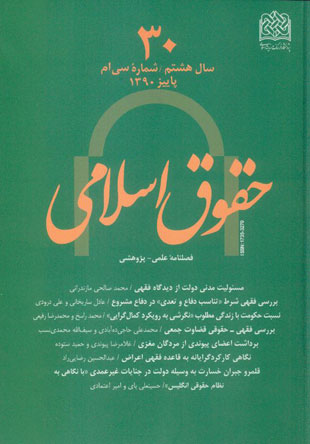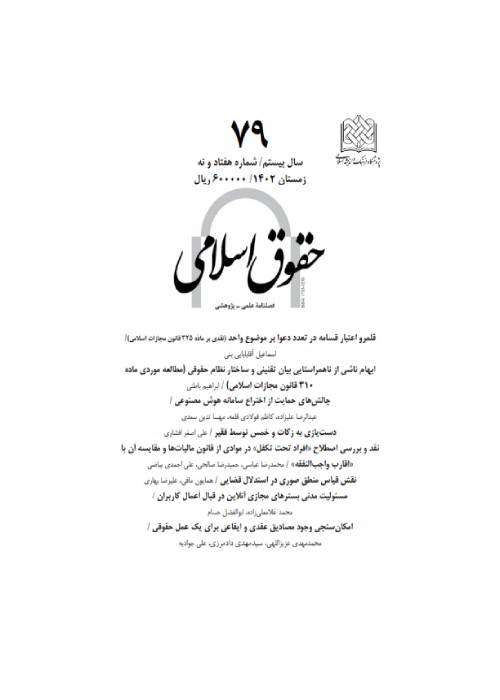فهرست مطالب

فصلنامه حقوق اسلامی
سال هشتم شماره 3 (پیاپی 30، پاییز 1390)
- 198 صفحه، بهای روی جلد: 40,000ريال
- تاریخ انتشار: 1390/09/15
- تعداد عناوین: 7
-
-
صفحه 77
-
صفحه 109
-
Page 7In the modern legal systems, the government's civil liability is a new idea. Till the first half of the 19th Century, the principle of the government's irresponsibility was considered as a consequence of governance; and nowhere in the world, governments considered themselves as being forced to compensate losses borne by their subjects, and deemed the principle of irresponsibility as a simple and reasonable consequence of governing the country. Even in the Roman Code, in which there was the idea of liability and compensation, the Empire could not be prosecuted at all; and fault as a basis for liability in this legal system was an attribute which might be applied only to private individual's conducts. In the Iranian legal rulings, for the first time in 1339/1960, the government's civil liability for some detrimental acts done by the employees of the government was mentioned in brief in the Article 11 of the Civil Liability Code. After victory of the Revolution, however, the government's civil liability for detrimental acts done by some employees of the government has been mentioned in the Article 171 of the Constitution and in the Article 58 of Islamic Criminal Law. Since according to the Article 4 of the Constitution, all laws and rulings should be based in juridical foundations and the principle of the government's civil liability cannot be juridically denied, it should be admitted that in the Iranian legal system no independent and serious study has been made concerning the juridical foundation of the government's civil liability. In the present article, we try to enlist juridical arguments which may be referred to and study to which extent such arguments suppose this principle.Keywords: liability, civil liability, government, public treasury, employees, agents
-
Page 29In legal terminology, proportion refers both to proportion between risk and loss resulted from attack and risk and loss resulted from defense and at the same time it refers to proportion between defense to prevent the risk and loss produced by the encroaching one and the encroachment. Concerning risks and losses resulted from encroachment, jurists speak generally about dangers for life and reputation as well as financial risks. Nor have they doubted about suitability of every detrimental act (even killing the encroaching one) if necessary to prevent him fromendangering other's lives or reputations. In spite what that may be understood at first glance, killing the encroaching one to defend properties has not been prescribed by Muslim jurists as a suitable defense. But if the encroaching one (if he is of sound mind, free, and of legal age) resists the defending one and if he cannot be prevented, the Holly Legislator prescribes to kill him to protect person's security. The defender should be sure in a conventional and reasonable way that his defensive act does not exceed what that is necessary to push the encroaching one awayKeywords: legitimate defense, proportion, necessity, encroachment
-
Page 59Are governments responsible to provide an ideal life for their citizens just in the same way that they are responsible to provide security, welfare, and health services for them? According to the perfectionist approach, just in the same way that governments are obliged to provide security, welfare and health services for their citizens, they are responsible in this concern which is mentioned as "good" and "ideal life". As an old approach in the history of political thought, this approach consists of two parts: A model of the ideal life which should be realized Action taken by the government to realize this model. The two parts have been interpreted in various ways which will be discussed in the present article.Keywords: government, ideal life, impartiality, perfectionism
-
Page 77Collective judgment, also known as consultative judgment, is judging a civil or penal case by at least three judges in such a way that the verdict issued is accepted by all or majority of them. In the existing juridical and legal literature, this kind of judgment has not been discussed in details. In the present article, arguments posed by jurists and legalist for and against it have been introduced; and the arguments for it are considered as being more acceptable and, because of the conditions of judgment in the present age (age of Occultation) and complexities of the contemporary cases, the collective judgment has been deemed as being more reliable than the individual judgmentKeywords: judgment, council, consultative judgment, collective judgment, plurality of judges
-
Page 109The present work is a juridical study to explain donation of transplanted organs by the brain deceased who are, according to details of the "Organ Transplantation and Brain Death Act (2000)", certainly dead. As a result of this study reasons of donation of the transplanted organs are limited to emergency and permission issued by the Guardian Jurist of Muslims. Thus, considering some excuses to donate organs such as "bringing other soul to life", "altruism", "the rule of conflict" and the like as a permitting reason has been criticized and the author has shown that such excuses are not acceptable.Keywords: brain death, amputation, one's authority on his own self, emergency, permission issued by the Guardian
-
Page 131In the present article the juridical rule of renunciation which has not been discussed in details in the juridical sources but is taken as a basis for some articles of law in the Iranian Civil Code is discussed and studied in more details aiming to elevate Iranian substantiate laws and their functional aspects and protect financial security in the society. Also, studying laws of some countries and making comparisons between them on the one hand and the Shii jurist's views on the other- which have been dispersedly introduced in the juridical sources-, the author will try to find the lost links of this important rule which has caused practical problems for the legislators and executors and propose the correct idea in each case. Finally, based on the foundations and arguments posed for this rule, it will be evaluated that to which extent this rule may be used. Points in this article the author will try to explain and prove are as follows: The extent that this rule may be generalized, how renunciation may be proved and what is the difference between renunciated property and lost and abandoned property, that renunciation will be of no effect if the owner returns to his property, probability of returning and the effect of renunciation on collective and common rights, and finally that concerning immovable properties, one will not be dispossessed of his own property if he renunciates.Keywords: renunciation, ownership, juridical rule, jurisprudence, property, functionalist look at jurisprudence
-
Page 159Unintentional crimes are always accompanied by harms and damages to the victim and compensation of such damages is of paramount importance; while in some cases punishing the one who has committed the crime is not the main concern of the victim or his/her heirs. On the other hand, sometimes, because of financial inability of the one who has to pay blood-money or since he has died or escaped compensation of damages is not possible. For the same reason, in Iranian Law, such damages are compensated by paying blood-money from the public treasury. Nevertheless, the State compensates damages in certain cases and this is far from the ideal conditions. It is necessary that compensation, in unintentional crimes, be done in a more consistent way and its scope be expanded. In the British legal system a kind of compensation by the State may be seen; but it is only by its name a governmental compensation and it is people who pay for compensation and not the State. A passing look at this legal system will show the situation.Keywords: unintentional crimes, damage, blood, money, compensation, public treasury


